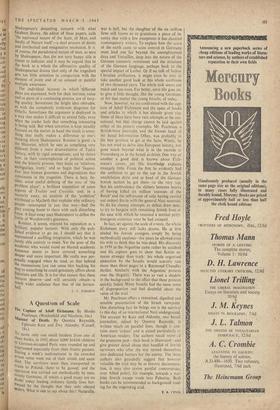A Question of Scale
The Capture of Adolf Eichmann. By Moshe Pearlman. (Weidenfeld and Nicolson, 16s.)
To quote only one small incident from one of these books, in 1942 about 4,000 Jewish children in German-occupied Paris were rounded up and triPrisoned separately from their frantic parents. During a week's maltreatment in the crowded Prison some went out of their minds and some died. The survivors were then transported in trains to Poland, there to be gassed; and the operation was carried out methodically by men, mostly Germans, of whom a good many are no doubt today leading ordinary family lives but- tressed by the thought that they only obeyed orders. What is one to say about this? Naturally,
war is hell; but the slaughter of the six million Jews still looms as so gratuitous a piece of in- sanity that with a few exceptions it has daunted contemporary writers. To explain how the scum of the earth came to seize control in Germany must lead one far beyond the unemployment days and Versailles, deep into the nature of the German romantic movement and the structure of the German language, perhaps back to the special impact of Luther. Or if we talk of J udeo- Christian civilisation, it might even be time to take another good look at this whole symbiosis of two thousand years. The whole task seems too much and too soon. Far better, since life goes on, to give it little thought, like the young Gentians. or for that matter the young Israelis, of today.
Now, however, we are confronted with the cap- ture of Adolf Eichmann and the spate of books and articles to which it has already given rise. Some of these have been vain attempts at the sen- sational, but that charge cannot be laid against either of the present examples. Mr. Pearlman, a British-born journalist and the former head of the Israel Information Office, was probably in the best position to get at the facts. Wisely, he has not tried to delve into European history, nor gone much beyond what is in the records at Nuremberg or in the Israeli archives. One way or another a good deal is known about Eich- mann's career, yet this knowledge explains strangely little. From the first he evidently had the ambition to get to the top in the Jewish annihilation drive and as head of the Gestapo Jewish section he got there—to the very top. But his ambivalence (he slithers between boasts of having killed six million 'enemies of the Reich' and the self-excuse of only having carried out orders) fits in with the general Nazi neurosis. So do his clumsy attempts, as defeat drew near, to try to bargain with remaining Jewish lives or the ease with which he resumed a normal petty- bourgeois existence once he had escaped.
In fact, set against the scale of events, the whole Eichmann story still lacks drama. He at first eluded his Jewish avengers simply by being methodically cautious—for years he allowed even his wife to think that he was dead. His discovery in 1959 in the Argentine came rather by accident and his capture goes to show that fiction re- mains stranger than truth: his whole organised abduction by the Israelis would scarcely rate more than three pages in a Raymond Chandler thriller. Similarly with the Argentine protests over the illegality. There was so vast a shadow in the background to the affair that these protests quickly faded. Many Israelis feel the same sense of disproportion and feel doubtful about the value of the trial.
Mr. Pearlman offers a restrained, dignified and
sensible presentation of the Israeli viewpoint. One disturbing fact he brings out is the survival to this day of an international Nazi underground. The account by Katz and Aldouby, two Israeli journalists, edited by Quentin Reynolds, is written much on parallel lines, though it con- tains more 'colour' and is aimed particularly at American readers. The authors recall more of the gruesome past--their book is illustrated--and give greater detail about that handful of Jewish survivors who after the war turned themselves into dedicated hunters for the enemy. The three authors also guardedly suggest that however valuable the trial may be as historic documenta- tion, it may also revive painful controversies, over Allied policy, for example, towards a war-
time Jewish escape route into Palestine. Both books can be recommended as background read- ing for the impending trial.
Ir. R. FYVEL






































 Previous page
Previous page